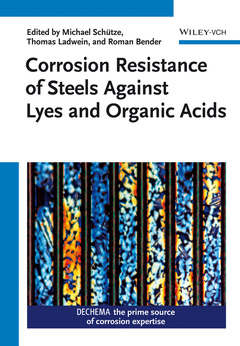Description
Corrosion Resistance of Steels against Lyes and Organic Acids
Coordinators: Schütze Michael, Ladwein Thomas L., Bender Roman
Language: English
Subject for Corrosion Resistance of Steels against Lyes and Organic...:
Keywords
handbook; corrosion; steels; data; provides; construction; manufacturing; dechema corrosion; information; tabulated; numerous; corrosion properties; types; chromium; chromiumnickel; acid; media; formic
438 p. · 17.8x25 cm · Hardback
Description
/li>Contents
/li>Biography
/li>
This must-have reference for all chemical engineers, material scientists and chemists working with steel or acidic media explains how to strengthen the corrosion resistance of steels as reaction, transport and storage devices against lyes (hydroxides) and organic acids.
The handbook contains comprehensive information, including tabulated data and references, on the corrosion properties of the following materials:
Unalloyed steels and cast steel
Unalloyed cast iron
High-alloy cast iron
High-silicon cast iron
Structural steels with up to 12% chromium
Ferritic chromium steels with more than 12% chromium
Ferritic-austenitic steels with more than 12% chromium
High-alloy multiphase steels
Ferritic/perlitic-martensitic steels
Ferritic-austenitic steels/duplex steels
Austenitic chromium-nickel steels
Austenitic chromium-nickel-molybdenum steels
Austenitic chromium-nickel steels with special alloying additions
Special iron-based alloys
The following corrosive media are considered:
Acetic Acid
Alkanecarboxylic Acids
Carbonic Acid
Formic Acid
Sulfonic Acids
Alkaline Earth Hydroxides
Ammonia and Ammonium Hydroxide
Lithium Hydroxide
Potassium Hydroxide
Sodium Hydroxide
Unalloyed steels and cast steel
Unalloyed cast iron
High-alloy cast iron
High-silicon cast iron
Structural steels with up to 12% chromium
Ferritic chromium steels with more than 12% chromium
Ferritic-austenitic steels with more than 12% chromium
High-alloy multiphase steels
Ferritic/perlitic-martensitic steels
Ferritic-austenitic steels/duplex steels
Austenitic chromium-nickel steels
Austenitic chromium-nickel-molybdenum steels
Austenitic chromium-nickel steels with special alloying additions
Special iron-based alloys
The following corrosive media are considered:
Acetic Acid
Alkanecarboxylic Acids
Carbonic Acid
Formic Acid
Sulfonic Acids
Alkaline Earth Hydroxides
Ammonia and Ammonium Hydroxide
Lithium Hydroxide
Potassium Hydroxide
Sodium Hydroxide
Thomas L. Ladwein, born in 1955, studied chemistry and metallurgy at the Universities of Saarbrücken and Münster, and graduated with a Diploma in Chemistry in 1980 and a PhD in Sciences in 1984. After that he worked as a R&D and application engineer for a chemical fabricator specialized in refractory metals. In 1987 he joined the stainless steel divison of Thyssen AG (later ThyssenKrupp AG) and worked there in several positions in R&D, application engineering and technical marketing. Since 2003 he is full time professor for electrochemistry, corrosion and tribology at Aalen University of Applied Science. He works in various committees and working parties of DECHEMA, GfKORR (German Corrosion Society), VDEh (German Iron and Steel Institute) and NACE International. He is current chair of the NACE committee "STG 39: Process Industries - Materials Applications and Experiences" and chairman of the NACE European Area. In 2011 he received the Herbert H. Uhlig Award from NACE International.
Roman Bender, born in 1971, st




